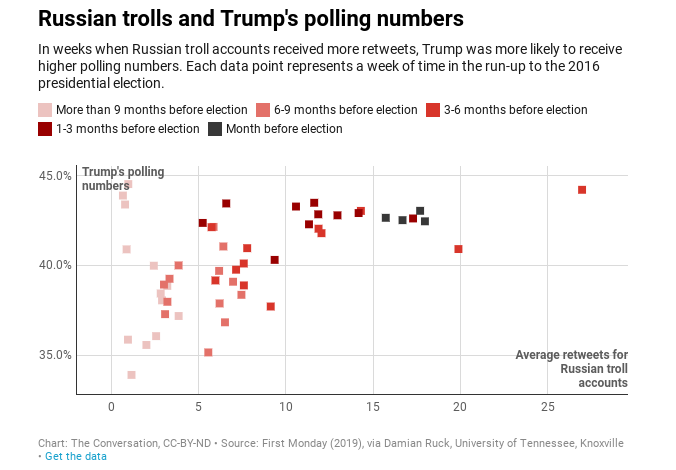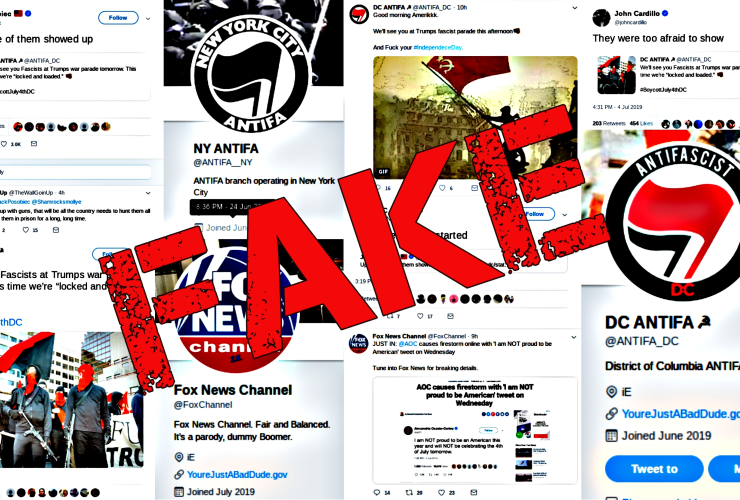As the federal election draws nearer, National Observer is committed to bringing you the news you need to stay informed. Through the Election Integrity Reporting Project, we're publishing exclusive investigations, in-depth analyses, fact-checks and breaking news, spanning topics from climate change to hate groups to fake social media accounts and beyond. Now, we're also adding a weekly round-up to bring you a condensed version of the week in disinformation-related news.
This edition includes a viral video of Prime Minister Justin Trudeau at the G20 summit, a scandal-plagued robocall firm implicated in a mysterious mass text-messaging campaign, signs of foreign interference targeting Canada’s election, evidence that Russia’s 2016 influence operation may have boosted support for Donald Trump, not-so-great results from an external audit of Facebook — and more.
Edited video of Trudeau
Global News shared a video late last week that appeared to show Prime Minister Justin Trudeau being snubbed by Brazilian President Jair Bolsonaro at the G20 Summit in Osaka, Japan. Trudeau was seen motioning to Bolsonaro, only to watch as the Brazilian president turned his back, seemingly giving Trudeau the cold shoulder and ignoring his attempt at a handshake. The clip ended at that point.
Initially, Global's caption and related coverage did not mention the apparent snub. But many others on Twitter were quick to seize on an opportunity to ridicule the prime minister. The account for conservative advocacy group Canada Proud was one of many to share the video with a caption focusing on Trudeau's apparent rejection and awkwardness on the global stage.
The video was eventually shared in Canada by pundits and mainstream news outlets alike, as well as by international newspapers, prompting comments such as, “Trudeau is a walking embarrassment,” “No one gives a sh-t about Justin from Canada,” “Poor Justin from Canada” and “Pathetic.” Notably, Russian propaganda outlet Sputnik News also weighed in on the viral video, as did the Spanish-language version of RT, formerly known as Russia Today. Both Kremlin-funded outlets pushed the widespread narrative suggesting that Trudeau had been snubbed.
The only problem? The incident never happened — at least, not the way it was depicted in the viral video, which edited out the part where Bolsonaro turned back to Trudeau and embraced him a moment later.
As it turns out, Trudeau was motioning to Bolsonaro to direct his attention to another person waiting to greet him. He wasn’t rejected or snubbed, and the full, unedited video makes that clear.
Here is a more accurate portrayal.@JustinTrudeau politely hand gestures Brazilian President @Jairbolsonaro that someone wishes to shake his hand on the opposite side of him.
— Jaro Giesbrecht (@JaroGiesbrecht) June 29, 2019
Then the two leaders shake each others hands & smile at the #G20Summit #Cdnpoli pic.twitter.com/NFWzaNbhg2
Note: This video has been updated for additional context to include a shot of Brazil's Jair Bolsonaro shaking Prime Minister Justin Trudeau's hand at the G20 summit in Osaka.
— Globalnews.ca (@globalnews) July 1, 2019
Full story: https://t.co/J2PhCQc7u9 #cdnpoli pic.twitter.com/a7yDS8JJtm
Some media outlets, including Global News, have posted updates after initially sharing the deceptively edited clip. But by the time the unedited video surfaced, the headlines were written and the damage was done. Many of the tweets sharing the deceptive video were retweeted thousands of times and have not been taken down or updated.
This type of video is par for the course for Canada Proud, a national spinoff of Ontario Proud, which helped boost the campaign of Ontario Premier Doug Ford last year. The group is known for creating hyper-partisan viral memes and videos mocking Trudeau and other Liberals, often by highlighting supposed missteps and blunders.
The incident this week should serve as a cautionary tale for journalists, media outlets and citizens alike. It's easy to hit the "retweet" button, but with the amount of misinformation and disinformation circulating on social media, we all have a responsibility to verify before we share — and to correct the record when we share misleading content. As student journalist Noel Harper commented on Twitter, “... maybe it’s time to start thinking before we tweet. There’s an election in October. An important one. We know that there will be lies and misinformation from all sides, aided and abetted by this, again, dumb platform."
With so much hype surrounding the looming threat of “deepfake” videos, this is also an important reminder that it doesn’t take sophisticated technology to create a deceptive video and push a misleading narrative into the headlines. The human mind is the weakest link in the chain of misinformation, and appealing to our biases is a tried-and-true tactic that has proven to be startlingly effective, even without the assistance of technology.
Russian propaganda on Twitter correlated with Trump support
A new analysis published this week in the open-access, peer-reviewed journal First Monday provides evidence that Russia’s 2016 social media-based influence operation may have boosted support for then-U.S. presidential candidate Donald Trump. The study found that high levels of Russian social media activity were correlated with increased public support for Trump, particularly in the immediate lead-up to the election.
The analysis tracked the Twitter activity of Russian operatives linked to the Internet Research Agency (IRA), colloquially known as Russia’s “troll factory.” During the 2016 U.S. presidential campaign, operatives working for the IRA sent hundreds of thousands of English-language tweets aimed at influencing the election by denigrating then-candidate Hillary Clinton and boosting Trump.
According to the new analysis, those tweets may have actually helped sway voters in favour of Trump — meaning Trump may owe his victory, at least in some part, to Russian social media propaganda.
"We found that exposure to Russian propaganda may have helped change American minds in favour of Republican candidate Trump," wrote the study's lead author, Damian Ruck, in an article explaining his team's findings.
When Russian operatives were most active on Twitter, support for Trump in opinion polls climbed, the analysis found. Specifically, every 25,000 retweets by IRA accounts predicted a one per cent increase in support for Trump in opinion polls. In fact, Russian Twitter activity more accurately predicted Trump's performance in opinion polls than Trump's own Twitter activity, according to the analysis.

"Our results show that the weeks when Russian trolls were accumulating likes and retweets on Twitter, that activity reliably foreshadowed gains for Trump in the opinion polls," Ruck wrote. "It turns out that the activity of Russian Twitter trolls was a better predictor of Donald Trump's polling numbers than his own Twitter activity."
As Ruck noted, more voters than usual were undecided leading up to the 2016 presidential election. A full 13 per cent of U.S. voters didn't decide who they were voting for until the last week before the election — "a time when Russian Twitter trolls were at their most prolific," Ruck noted. During that time period, Russia didn't just push out a high volume of tweets; they specifically pumped out tweets aimed at eliciting fear and anger.
For some undecided voters, that approach may have been enough to help sway them in favour of Trump. Among that 13 per cent of undecided voters, the majority cast their ballots for Trump.
While the new study doesn't show causation, it does provide evidence that social media propaganda, particularly when combined with a hyper-partisan media ecosystem, can effectively shape public perceptions on a mass scale.
External auditors say Facebook's white nationalist ban isn't working
An external audit of Facebook’s policies and practices determined that the social media company’s ban on white nationalism doesn’t go far enough and isn’t achieving its goal of removing white nationalist content from the platform.
The auditors were appointed by Facebook in 2018 to evaluate the company’s progress toward “advancing civil rights” on its platform, including its implementation of policies banning hate speech and discrimination. According to their assessment:
Facebook’s current white nationalism policy is too narrow, because it prohibits only explicit praise, support or representation of the terms ‘white nationalism’ or ‘white separatism.’ The narrow scope of the policy leaves up content that expressly espouses white nationalist ideology without using the term ‘white nationalist.’ As a result, content that would cause the same harm is permitted to remain on the platform.
Facebook implemented its ban on white nationalist and white separatist content in March. Before that, the platform’s hate-speech policies only covered white supremacist content. But as the new audit shows, Facebook’s policy is not getting the job done.
By focusing only on content that explicitly uses the term “white nationalist,” Facebook is overlooking the fact that far-right extremists deliberately use coded language, symbols and words with altered meanings to stay under the radar and evade social media bans.
Similarly, hate groups and extremists often defend offensive and hateful content by hiding behind the veil of “humour.” Facebook’s current hate-speech policy includes an exception for humour, but the audit team is recommending that this exception be removed.
Canada's election already targeted by foreign interference
With the federal election just a few months away, Canada’s intelligence community announced this week that it has identified “foreign actors attempting to directly influence the upcoming federal election campaign,” according to a joint investigation by the Toronto Star and BuzzFeed News.
Canada’s cyberdefence agency, the Communications Security Establishment (CSE), has “briefed senior political staff of one federal party about ‘covert and overt’ attempts to influence the Oct. 21 federal election,” Buzzfeed News reports. Additionally, the Canadian Security Intelligence Service (CSIS) warned on Tuesday that “threat actors” are targeting Canadian citizens with influence operations.
The nature of the interference is not clear, but may include anything from state-sponsored propaganda and media influence to hacking and other cyber operations such as social media manipulation, the intelligence agencies said. They also said the “broad” scope of interference activities includes more traditional espionage tactics like blackmail and the release of forged documents.
Foreign actors are also likely seeking to understand the nuances of Canadian discussions surrounding hot-button social and political issues in an effort to better target these issues in future interference operations, one former intelligence analyst told Buzzfeed News.
Facebook addresses sensational health claims
Facebook announced this week that it is downgrading content that makes sensational, misleading or dubious health claims, including posts that try to sell or promote "miracle cures."
This comes after widespread criticism following reports that Facebook’s algorithm was boosting potentially dangerous health-related information, including posts promoting homemade cancer cures. These dubious claims were found to be featured more prominently than information from authoritative sources like cancer organizations and charities.
Just this week, a Wall Street Journal investigation found that both Facebook and YouTube “are being flooded with scientifically dubious and potentially harmful information about alternative cancer treatments, which sometimes gets viewed millions of times.”
Facebook's new announcement appears to come in response to these revelations.
“In order to help people get accurate health information and the support they need, it’s imperative that we minimize health content that is sensational or misleading,” Facebook product manager Travis Yeh wrote in a blog post this week.
According to Yeh, Facebook implemented two “ranking updates” in June aimed at reducing the visibility of posts that make sensationalist claims about health-related products and remedies. The company is also targeting posts that seek to sell products or services based on exaggerated or overhyped claims, such as cancer cures or miracle weight-loss drugs.
In a related move, Facebook also announced recently it planned to crack down on anti-vaccine content.
Mysterious text-messaging campaign targeting Ontarians linked to robocall firm
A mysterious mass text-messaging campaign asking Ontarians about their views on the federal carbon tax has been traced back to the same robocall firm implicated in a 2011 scandal in which the company, iMarketing Solutions Inc., called voters in Ontario and told them to show up at the wrong place to vote.
This comes just a few weeks after Ontarians started receiving automated text messages from someone purporting to be “Sue” from a group called “Ontario Strong.” The messages, which asked people if they agree that the federal carbon tax should be scrapped, appeared to be an attempt to identify voters who oppose the carbon tax, potentially for the purpose of targeting them during the election campaign.
However, the group behind the text messages, Ontario Strong, remained shrouded in mystery, leaving many wondering who they are and what they’re up to. Not anymore.
According to the Vancouver Sun:
Postmedia traced the texts to iMarketing Solutions Inc., a Toronto firm founded by the directors of Responsive Marketing Group, the company at the centre of the 2011 Robocall scandal wherein company employees directed Ontario voters to the wrong voting sites.
Victoria resident Andrew McFadden, who works at the tech firm Iris Dynamics in Victoria, obtained the phone number’s associated IP address using software at his company, and then used a reverse-DNS search to trace it back to iMarketing. He also found the number’s home phone directory, which reroutes to iMarketing.
Postmedia has copied McFadden’s steps and confirmed BC Strong and Ontario Strong are connected to iMarketing.
That's all for this week — thus far. Stay vigilant, and make sure to stay tuned to National Observer's ongoing coverage of disinformation, social media manipulation, propaganda and more.
The same text messages from
The same text messages from Sue were circulating in BC. Every member of my family received this. How are these actors obtaining phone numbers on such a broad scale?
Caroline, thank you for this
Caroline, thank you for this work. Can you please do a story on why other media firms are not doing their due diligence, such as with the Bolsonaro video? Is it that they lack relevant knowledge and skills, or don’t care, as long as they win eyeballs and reaction, or because they have a political agenda themselves, either at the production level or at the ownership level?
Canadians deserve better from their media services. As for Facebook and YouTube, if they haven’t got the will to fix this peddling of white supremacy and medical misinformation, they deserve to be sued, fined, and regulated out of existence. They are establishing themselves as not much more than the propaganda infrastructure and enablement services for the world’s bad actors. Therefore, they are themselves clearly bad actors.







Comments